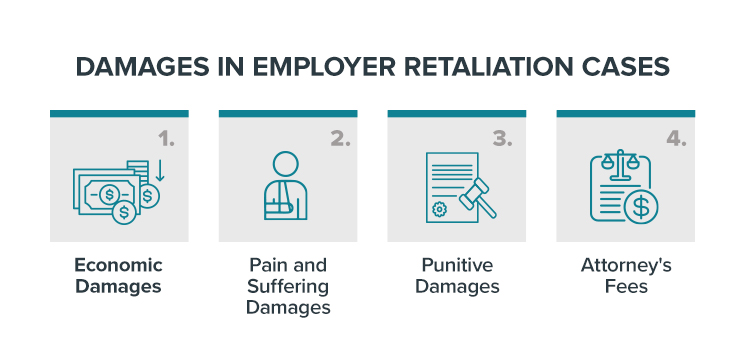Employees have legal rights that their employers must acknowledge and honor. If an employer punishes you for doing a legally protected activity, you might pursue an employer retaliation case against the company. All cases vary, and many factors influence how much your retaliation lawsuit or settlement could be worth. Plus, you may recover different types of damages.
This article discusses the factors that impact employer retaliation lawsuits and settlement amounts and how the attorneys at Weisberg Cummings can help. Learn more, or contact one of our trusted lawyers for personalized support.
What Is Employer Retaliation?
Retaliation occurs when an employer punishes an employee for participating in a lawfully protected activity. Common examples of these protected activities include the following:
- Refusing to violate a state or federal law
- Making a complaint about an unsafe work environment
- Opposing unlawful discrimination or harassment
- Making a complaint about not getting paid the legally mandated minimum wage or overtime
- Requesting reasonable accommodations due to a disability
- Taking a leave of absence under the Family and Medical Leave Act (FMLA)
- Serving on jury duty
- Filing a complaint with the labor board
- Filing a workers’ compensation or unemployment compensation claim
If the employer retaliates against an employee for taking one of these actions, they may unlawfully do one or more of the following as a form of punishment:
- Firing them
- Demoting them
- Reassigning their work
- Decreasing their wages
- Disciplining them
Federal law prohibits employer retaliation, and affected persons can take legal action to protect their interests.
What Should You Do If You Suspect Employer Retaliation?
If you suspect you have been a victim of employer retaliation for reporting illegal discrimination, you can file a formal complaint with the United States Equal Employment Opportunity Commission (EEOC). Filing a complaint is a lawfully protected activity, and workers can pursue some cases entirely through the EEOC without filing a lawsuit.
If you cannot resolve your dispute through the EEOC, you can request a right-to-sue letter, which authorizes you to file a lawsuit against your employer in court. You may be entitled to damages if you carry out your dispute with a lawyer or with an EEOC charge.
Some retaliation claims can be filed directly into the court system, with OSHA or with the National Labor Relations Board (NLRB). If you think you’ve been a victim of illegal retaliation, it’s important to quickly identify where to file and when, because some claims have filing deadlines as short as 30 days.
How Much Is an Employer Retaliation Lawsuit Worth?
Various factors determine retaliation lawsuit payouts or compensation — there is no definite answer. The common influencing elements include:
1. Nature of the Retaliation
When an employer behaves especially egregiously, this can impact your case’s value. The type of retaliation also plays a fundamental role. For example, was the retaliation in the form of termination, demotion or pay reduction? What was the duration of the retaliation? These circumstances can increase the damages you may claim as lost wages and benefits, especially when you earn a high income.
2. Impact on the Employee
Employer retaliation can have myriad adverse implications, including:
- Emotional distress: Generally, courts have the discretion to determine damages for emotional distress. Evidence of emotional or physiological harm can lead to higher compensation.
- Financial losses: As mentioned, lost wages, benefits and future earning potential due to retaliation are usually included when calculating the compensation for employer retaliation.
- Career impact: If the retaliation has a long-term effect on your career prospects, the lawsuit’s value can increase.
Remember, there are no guarantees, as the circumstances of each case differ.
3. Evidence Available
The strength of your evidence can affect how much you might receive in an employer retaliation case. For example, having strong proof to support claims, such as emails, performance reviews and witness testimonies, can enhance the case’s credibility and value. Also, the timeline of events leading up to and following the retaliation action can play a role in establishing a causal link.
4. Employer’s Conduct
If the employer acted with malice or reckless disregard for your rights, you may be able to recover punitive damages — we will discuss the details later. If your employer has a history of treating employees poorly or violating their legal rights, this could increase the worth of your retaliation lawsuit. A pattern of retaliatory behavior within the organization strengthens your case.
5. Legal Framework
The laws under which you file the lawsuit can affect the potential damages and remedies available. For example, under the Civil Rights Act of 1991, courts can award punitive damages and pain and suffering up to certain limits based on the company’s size. However, this cap excludes damages like lost wages, bonuses, pensions and health care costs.
6. Litigation or Settlement Potential
Litigation and settlement may have different potentials regarding how much you can recover. Most employers prefer settling disputes out of court since the cost of litigation can be significant, and the outcome can be uncertain. In either option, getting legal representation improves your chances of success. Lawyers can negotiate favorable terms or argue on your behalf in court, leveraging their knowledge and experience in this practice area.
7. Litigation or Settlement Costs
Besides how much you can recover, it’s also crucial to consider the potential costs. The usual expenses include attorney and filing fees, as well as mediator charges if you appoint one. When choosing an attorney, prioritize experience, reputation and track record. The most affordable options are not always the ideal. You may also find that attorneys may handle some cases on a contingency fee basis, where fees are a percentage of recovery, so that you are not burdened with up front, out of pocket, legal costs.
Damages in Employer Retaliation Cases
You can pursue monetary compensation for the losses suffered due to your employer’s unlawful conduct. These include:
1. Economic Damages
You may be able to recover economic damages for past and future monetary losses caused by employer retaliation. Examples of economic damages include any of the following sources of income that the employee will no longer earn because their employer treated them unlawfully:
- Salary
- Commission
- Bonuses
- Hourly wages
- Benefits
Since wages and benefits differ, the specific amount will also vary.
2. Pain and Suffering Damages
If employer retaliation caused any of these negative emotions, you may be entitled to pain and suffering damages:
- Emotional pain
- Humiliation
- Mental suffering
- Frustration and anger
- Embarrassment
- Reputational harm
These can be more challenging to recover than economic damages. To prove you suffered from emotional harm, you may have to undergo an official examination from an expert who may also testify at trial on your behalf.
3. Punitive Damages
In particularly egregious employer retaliation lawsuits, employees may be able to recover punitive damages. These intend to punish the company for acting with the following:
- Malice
- Oppression
- Fraud
Recovering punitive damages can be challenging because you need a lot of proof that the employer retaliated against you and acted in a heinous way. A jury will determine the amount of punitive damages you can recover, though under certain laws, there are predetermined limits depending on the company’s size, as earlier mentioned.
4. Attorney’s Fees
Other employer retaliation lawsuit awards may include attorney’s fees. To recover these damages, you must first go to trial and win your case. If you are successful, the court could order your employer to cover some or all attorney expenses. Attorney’s fees sometimes exceed the worth of an employer retaliation case, which often increases the lawsuit’s settlement value. And because most cases settle, it can be advantageous for you to recover attorney’s fees.
Contact Weisberg Cummings for Professional Support
To determine how much your employment retaliation case is worth, consider what you can claim in damages and the potential expenses. This assessment is essential because every case is unique. It’s best to contact an employment attorney to evaluate your case and provide personalized advice. Weisberg Cummings is ready to help.
We have handled many employment retaliation cases in Pennsylvania, supporting employees regardless of case complexity. Our trained attorneys will listen to your case and assist you in developing a practical legal strategy. We have the resources to achieve the best possible outcome. Contact us now for a free consultation!



